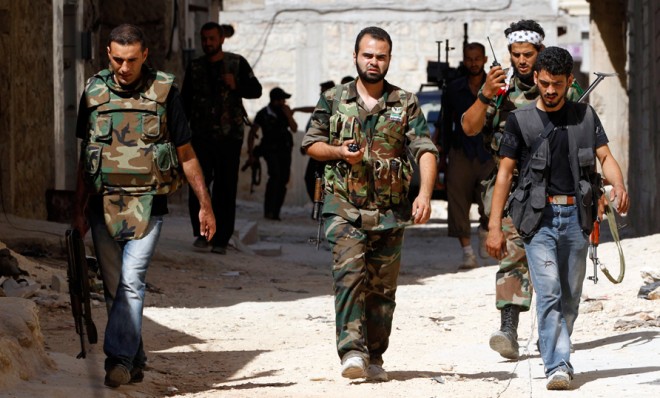Freedom fighters or al Qaeda? What you need to know about the Syrian rebels
A brutal execution video sparks concerns over who will lead the country after Assad

A free daily email with the biggest news stories of the day – and the best features from TheWeek.com
You are now subscribed
Your newsletter sign-up was successful
When Secretary of State John Kerry made his case for a military strike against the regime of Syrian President Bashar al-Assad on Tuesday, he tried to put the members of the Senate Foreign Relations Committee at ease by telling them that the opposition "has increasingly become more defined by its moderation, more defined by the breadth of its membership, and more defined by its adherence to some … democratic process and to an all-inclusive, minority-protecting constitution."
New, disturbing video footage smuggled out of Syria, however, has raised questions about Kerry's claim. Obtained by The New York Times from a former rebel, it shows seven Syrian soldiers on their knees, face down, with rebels standing above them with guns drawn. The rebels recite a poem, shoot the soldiers, and then place the bodies in an unmarked, mass grave.
(More: The war in Syria: A brief timeline)
The Week
Escape your echo chamber. Get the facts behind the news, plus analysis from multiple perspectives.

Sign up for The Week's Free Newsletters
From our morning news briefing to a weekly Good News Newsletter, get the best of The Week delivered directly to your inbox.
From our morning news briefing to a weekly Good News Newsletter, get the best of The Week delivered directly to your inbox.
The rebel commander in the video is a man named Abdul Samad Issa, 37, who leads a group of 300 rebels with the primary motivation of "revenge," reports the Times. His father disappeared after opposing Assad's father, former Syrian President Hafez al-Assad, in the early 1980s.
Issa's group, which calls itself Jund al-Sham, is one of an estimated 1,200 rebel groups fighting in Syria. The fractured nature of the opposition has sparked worries that Assad's potential ouster could lead to a sectarian battle for power, perhaps ending with an Islamist extremist group assuming control of the country.
So what do these potentially adversarial rebel groups look like?
The Free Syrian Army
A free daily email with the biggest news stories of the day – and the best features from TheWeek.com
When Kerry talks about the rebels in glowing terms, he is mostly talking about the Free Syrian Army, the main Western-backed rebel group led by Gen. Salim Idris. The group claims to be pursuing a democratic, secular government, which would respect minority groups like the Shiites, Alawites, Christians, and Druze, along with the country's Sunni majority. Kerry has reportedly considered flying Idris to Washington to help make the case for intervention in front of Congress.
"There are about 70,000 to 100,000 oppositionists," Kerry claimed. "Maybe 15 percent to 25 percent might be in one group or another who are what we would deem to be bad guys."
Islamic extremists
So who are these "bad guys?" Islamic extremists like the al Qaeda-linked Al-Nusra Front, which has attracted foreign jihadis and wants to install a strict interpretation of Islamic law in Syria.
Rebels from groups like the Al-Nusra Front might be outnumbered by the Free Syrian Army, but, as Paul Pillar, the U.S. intelligence community's former top Middle East analyst, told Reuters, "In a hard-fought civil war, especially one without a single well-organized opposition movement, success goes to the most ruthless and dedicated elements, which also tend to be the most extreme in their views."
Extremist groups have been so effective, officials told Reuters, that more moderate rebels are beginning to make alliances with them in their fight against Assad.
Bands of brigands
There are concerns that rebel groups, especially in the east and along the southern border with Jordan, have "largely devolved into 'gangs' whose leaders are more interested in operating local rackets and enriching themselves than in forming a larger alliance," according to Reuters. The Times backs up that assertion, reporting that there is a "growing body of evidence of an increasingly criminal environment populated by gangs of highwaymen, kidnappers, and killers."
Nearly two weeks before Kerry claimed with "high confidence" that the Assad regime was responsible for the reported chemical weapons attack near Damascus that killed 1,429 people, Gen. Martin Dempsey, chairman of the Joint Chiefs of Staff, warned Rep. Eliot Engel (D-N.Y.) in a letter about the pitfalls of military intervention.
"Syria today is not about choosing between two sides but rather about choosing one among many sides," Dempsey wrote. "It is my belief that the side we choose must be ready to promote their interests and ours when the balance shifts in their favor. Today, they are not."
Keith Wagstaff is a staff writer at TheWeek.com covering politics and current events. He has previously written for such publications as TIME, Details, VICE, and the Village Voice.
-
 ‘The mark’s significance is psychological, if that’
‘The mark’s significance is psychological, if that’Instant Opinion Opinion, comment and editorials of the day
-
 How did ‘wine moms’ become the face of anti-ICE protests?
How did ‘wine moms’ become the face of anti-ICE protests?Today’s Big Question Women lead the resistance to Trump’s deportations
-
 Currencies: Why Trump wants a weak dollar
Currencies: Why Trump wants a weak dollarFeature The dollar has fallen 12% since Trump took office